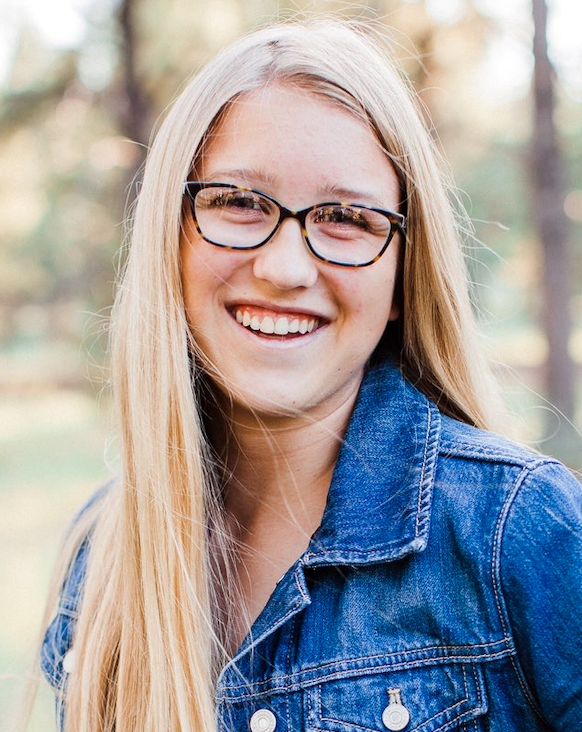Student Spotlight
Student Spotlight: Emma Blair
Open Dialogue Is the Key to Civil Speech on Campus
- GCU has been a great place to be fact-checked and end up being wrong in a debate, to learn from my mistakes and to allow myself to grow as a student and as a person.
- “[W]e as humans fail to present or consider other viewpoints unless we have to address them.”
- “I would say conservative students and groups need to be more careful when it comes to free speech on college campuses… cancel culture tactics are disproportionately aimed at conservative speech and not other political ideologies.”

Emma Blair
School: Grand Canyon University
Major: History
Summer Internship: Speech First
In your experience, is academic diversity and open dialogue encouraged at Grand Canyon University?
One of the best parts about GCU is the open dialogue across campus. Whether I am at GCBC, which is our on-campus coffee shop, walking across Lopes Lawn after class, or staying up until 2am in the college dorms, GCU is filled with great conversation about absolutely anything from how Coach Drew and Coach Miller have changed our basketball programs to the influence of GCU in our local community to navigating the politics of Arizona in an extremely purple state.
These are the conversations college students are supposed to be having because they challenge us to think for ourselves and not regurgitate information we heard from mom, dad, a professor, or a social media influencer. I cannot speak for all students because I am sure some have felt their voice suppressed or ignored, but for me GCU has been a great place to be fact-checked and end up being wrong in a debate, to learn from my mistakes and to allow myself to grow as a student and as a person.
In your opinion and experience, are all ideas and viewpoints treated with equal respect and merit in the classroom by students and professors? Are any specific ideologies given more credence?
I can only speak for my university, and what is interesting at GCU with my classes is it really depends on the professor. All ideas are treated with respect, but not all perspectives are necessarily presented from the lecturer’s side of the classroom. I had a liberal professor in one class who, because of her bias, really only presented her side. Afterwards, she would ask if anyone with different viewpoints would like to share, but she would not have discussed an opposite viewpoint otherwise. The same thing happened with a libertarian professor I had. He was very vocal about his ideas and would not necessarily acknowledge other perspectives unless students brought them up.
Although neither of these professors put premeditated effort into discussing other viewpoints, to their credit neither of them shut down or mocked other perspectives when students disagreed. They definitely challenged those students who disagreed with them, but they were never disrespectful. I am not sure if this is a problem specifically related to college campuses as much as it is a human problem. Frequently, we as humans fail to present or consider other viewpoints unless we have to address them. To GCU’s credit, I have had professors with a wide range of political, social, and economic perspectives and they have all been respectful of students’ multiple experiences, stories, and opinions.
You’ve been involved with conservative student groups on campus like Turning Point USA and Young America’s Foundation. What are some unique challenges that conservative students and groups face when it comes to free speech on campus?
In my experience, I would say conservative students and groups need to be more careful when it comes to free speech on college campuses. They don’t necessarily need to fear specific speech policies on campus; the real threat is students or people outside the university bubble who will find a picture or hear a rumor taken out of context, and take the opportunity to use against the conservative students or against the conservative organization. Only conservative groups seem to face this degree of scrutiny. I’m not singling out GCU or any particular university, but these kinds of cancel culture tactics are disproportionately aimed at conservative speech and not other political ideologies.
Do speech policies at your school make it easier or more difficult for students to express their opinions? Give us some examples.
GCU is a private university, which means it has the opportunity to get away with a lot regarding suppressing students’ speech. However, I think GCU recognizes the value in disagreement and in differing perspectives. To my knowledge, we don’t necessarily have speech codes as much as we have the reminder that we are also a Christian university and as Christians we are striving to demonstrate grace and respect. Our university policy handbook says we as Christians and ministers of the gospel are called to “avoid actions and speech that could show disrespect, a sharp tongue, harassment, prejudice, racism, sexism, vulgarity, foul language, or bullying. Students extend grace and charity at all points including discussions with others who differ with them.” I think GCU encourages beneficial speech while not restricting students’ First Amendment rights, which includes possibilities of hate speech.
College students are self-censoring in large numbers on campuses across the country. Why do you think that’s true? What are some contributing factors?
Students across the nation are self-censoring for fear of being suspended, failing to be hired for a job, or being ostracized from society. We see this because practical policy ideas are often turned into these outrageous questions of good and evil─ if someone disagrees with you politically, you do not just disagree, but you are now a bad person. For example, I think humans are better able to flourish when individuals and families are able to decide what to do with their own hard-earned paycheck, whether that is donate to charity, save for college, or spend on themselves. Others think that individuals and families should contribute to society by paying for welfare programs and other government programs first and then with what is left can spend on themselves and their families. Do I disagree with them on what would make a better community and society? Yes. Do I think they are an immoral, horrible human being for disagreeing with me? No. But unfortunately that is the narrative being sold.
You are working on a large-scale Bias Response Team research project this summer for Speech First. Give us an early look at the results. How are BRTs being used across the country to silence students for expressing their opinions?
I have currently examined over 115 university policy handbooks in just under half of the states to look for Bias Response Teams and other entities like it whose very existence threatens students’ First Amendment rights. Many of these universities use vague language which lacks clear definitions of bias, harassment, and other key terms. Also, some universities at best have ambiguous explanations for the procedures and processes established to investigate the reports against accused students, and at worst have a clear absence of any sign of due process. This is not only dangerous for the exchange of ideas and debate but is also unconstitutional.
